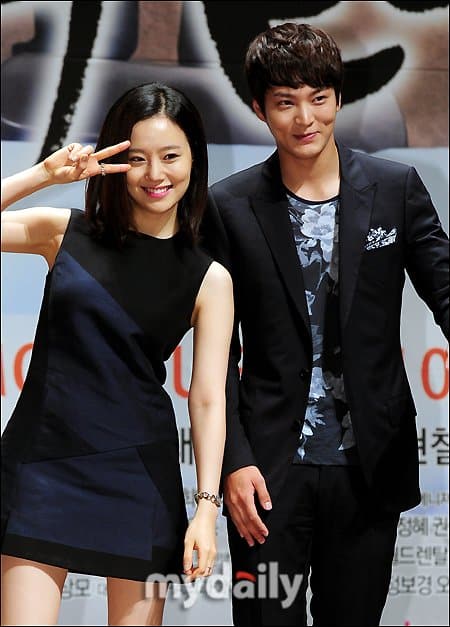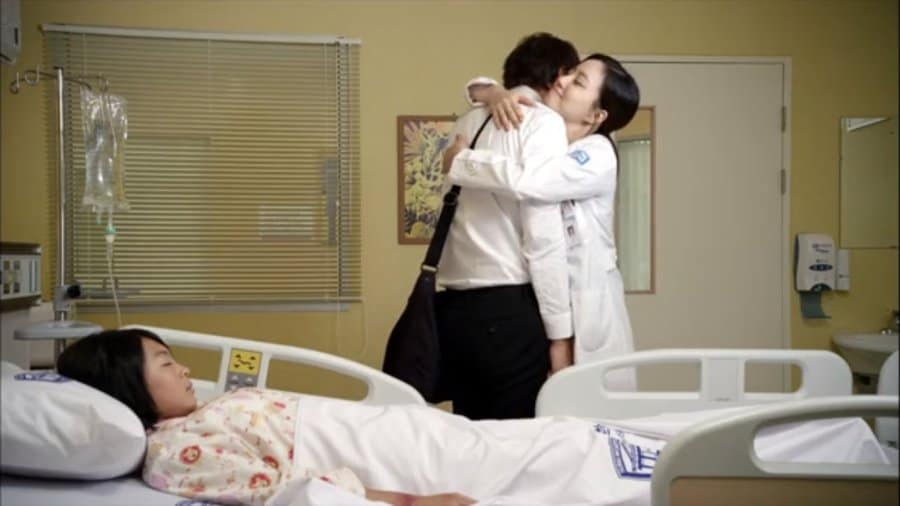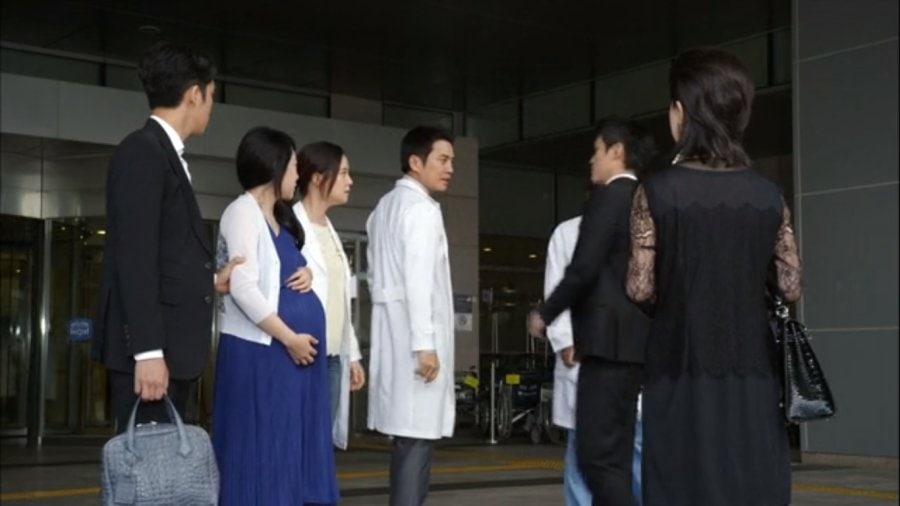Good Doctor (2013) is a South Korean medical drama with touches of romance and humor. It centers on a young doctor with autism who strives to overcome prejudice and prove his worth as a pediatric surgeon. The series explores themes of compassion, perseverance, and acceptance, making for a heartwarming narrative filled with life lessons.
In this spoiler-free review, we’ll delve into its story, characters, production quality, cultural nuances, and more, giving you a comprehensive look at why Good Doctor became such a beloved drama.

🎬 Synopsis
Park Si-on is a brilliant autistic savant with the mental and emotional traits of someone much younger than his age. Despite a difficult childhood, he enters the rigorous world of pediatric surgery as a resident, granted a six-month trial to prove he can function as a doctor.
The hospital environment proves challenging; many colleagues and patients doubt him, viewing him as childlike or unreliable due to his condition. Si-on’s biggest skeptic is his mentor, the strict Dr. Kim Do-han, who dismisses Si-on as a “robotic” doctor who relies only on textbook knowledge.
With support from a few understanding peers, like the kind Dr. Cha Yoon-seo and the friendly Dr. Han Jin-wook, Si-on navigates high-pressure surgeries and hospital politics. Along the way, he experiences friendship, personal growth, and even first love, all while fighting to earn acceptance in the medical world, a journey that is equal parts uplifting and challenging, but ultimately inspiring.
🎥 Production Details
Director
Ki Min-soo (with Kim Jin-woo as co-director) – Known for crafting heartfelt dramas, their direction balances medical realism with emotional storytelling.
Screenwriter
Park Jae-bum – Acclaimed for Good Doctor’s fresh concept, he later wrote other hit series (e.g. God’s Quiz and Chief Kim), showing a knack for blending human drama with niche settings.
Main Cast
Joo Won as Park Si-on, Moon Chae-won as Cha Yoon-seo, Joo Sang-wook as Kim Do-han, and Kim Min-seo as Yoo Chae-kyung. Notably, Joo Won was already known for intense roles (Bridal Mask) before impressing audiences with his sensitive portrayal of an autistic doctor.
Moon Chae-won, famed for melodramas (Nice Guy), brings warmth and depth as a supportive fellow surgeon. Joo Sang-wook (from Giant) convincingly embodies the tough mentor, and Kim Min-seo adds intrigue as a hospital administrator.
Network & Episodes
KBS2, 20 episodes (aired August–October 2013). As a prime-time KBS drama, Good Doctor ran in a Monday-Tuesday slot, maintaining high production values and a family-friendly tone.
Interesting Facts
The show’s working title was originally “Green Scalpel” (referring to a surgical knife) before it was changed to Good Doctor for clarity. Lead actor Joo Won even contributed to the soundtrack with a song titled “Love Medicine,” adding a personal touch to the production.

🧠 Detailed Analysis
Plot Development
Good Doctor’s story unfolds with a balanced mix of medical cases and character growth. The pacing is steady – early episodes hook you with tense emergency scenes and emotional patient stories, while later episodes deepen the central conflicts. The premise itself feels original and “out of the box,” as one reviewer noted, for daring to feature an autistic doctor as the lead.
The plot remains coherent and easy to follow, focusing on Si-on’s journey from underdog to trusted surgeon. Although the drama occasionally leans on familiar tropes (such as hospital politics and power struggles), it stays engaging by keeping the stakes personal and heartfelt.
A few subplots, like a hospital corruption scheme, are somewhat predictable and used mainly to add suspense; these can drag slightly but do not overshadow the main narrative. Overall, the storyline is engrossing and uplifting, successfully blending hospital procedural elements with a humanistic coming-of-age tale.
Characterization
Character development is a standout strength of Good Doctor. You’ll find that each main character is well-drawn and undergoes meaningful growth. Park Si-on is the heart of the show, a savant doctor with autism who evolves from a timid newcomer into a confident physician, all while maintaining a touching innocence.
Joo Won’s performance earned widespread acclaim for its authenticity; his portrayal of Si-on’s quirks, the awkward posture, nervous fidgeting, and literal speech, is so convincing that it “feels authentic” and never exaggerated.
As a viewer, you truly believe in Si-on’s condition and root for him. Cha Yoon-seo (Moon Chae-won) serves as both mentor and friend to Si-on. She’s compassionate yet outspoken, and through her, we see a realistic, gradual acceptance of Si-on as an equal
Kim Do-han (Joo Sang-wook), the strict senior surgeon, might frustrate you at first with his harsh treatment of Si-on, but his character is layered – driven by personal trauma and a desire for excellence. Watching his stance soften over time is rewarding.
Even side characters, like the gentle Dr. Han Jin-wook and the children in the pediatric ward, leave a strong impression. The child patients and young actors deserve a mention too – their innocence and struggles add emotional weight and often provide Si-on opportunities to shine as both doctor and friend.
In terms of acting, the entire cast delivers. From lead roles to supporting nurses and kids, performances are natural and heartfelt, grounding the show’s occasionally dramatic moments in genuine emotion.
Themes and Messages
Good Doctor wears its heart on its sleeve, weaving in clear themes of empathy, tolerance, and hope. At its core, the drama is a commentary on how society treats those who are “different.”
It challenges the skepticism and prejudice that someone with a developmental disability faces in a high-stakes profession. Through Si-on’s journey, the show conveys that being different is not a weakness; in fact, his unique perspective often benefits his patients in creative ways.
The series repeatedly delivers the message that “there is nothing wrong with being different,” presenting Si-on’s autism as a gift rather than a handicap. Each episode carries a lesson, whether it’s about trust between doctor and patient, the importance of teamwork, or standing up for what’s right.
The compassion displayed by characters like Yoon-seo and Dr. Choi (Si-on’s mentor in the hospital) highlights the value of understanding over judgment. On the flip side, the drama doesn’t shy away from showing the hurtful side of stigma; some scenes where Si-on endures bullying or doubt can be tough to watch, precisely because they reflect real prejudices.
Yet, these moments are what tug at your heartstrings and make the eventual triumphs all the more satisfying. In the end, Good Doctor imparts an inspiring belief in human potential and kindness, likely leaving you with a few life lessons of your own.
Cinematography and Soundtrack
Visually, Good Doctor is polished and clear. The hospital setting is rendered in a clean, bright style, from bustling emergency rooms to quiet moments in the pediatric ward, the camera captures both the urgency and the intimacy of medical care.
Director Ki Min-soo’s experience in drama storytelling shows in how scenes are framed to focus on characters’ facial expressions, emphasizing emotional beats. Surgical scenes are tense but not overly graphic, relying on direction and music to create suspense. Speaking of music, the soundtrack is memorable and perfectly tailored to the story.
Emotional ballads and gentle instrumental themes recur during poignant moments, amplifying the feels without being intrusive. Notably, the OST song “Miracle” by Lee Young-hyun stands out; its lyrics echo Si-on’s journey and can give you goosebumps when it plays at just the right time.
There are also upbeat tracks and softer melodies that accompany lighter, hopeful scenes. In fact, the lead actor Joo Won lent his voice to an insert song (“Love Medicine”), reflecting how invested the cast was in the project.
Overall, the production quality, from cinematography to sound, complements the narrative well, making the viewing experience immersive. It may not have flashy CGI or extravagant sets, but it delivers where it counts: drawing you into the hospital world and the characters’ emotional lives.
🌏 Cultural Context
Beyond its immediate story, Good Doctor offers a window into some aspects of Korean culture and societal attitudes. One significant context is how disabilities and neurodiversity are viewed in South Korea.
In 2013, seeing an autistic character in a leading role was unprecedented in K-dramas. The show bravely addresses the stigma head-on: initially, hospital authorities and staff are hesitant to accept a “handicapped” person as a doctor, mirroring real-world prejudices and low expectations that Korean society often had toward autism at the time.
For example, in the drama, Si-on must overcome institutional skepticism; he’s only given a chance because of a mentor’s insistence and even then under strict conditions.
This reflects a broader cultural reality where those with disabilities historically faced barriers in professional fields. The drama’s popularity actually helped spark conversations in Korea about workplace inclusion and understanding autism, indicating its cultural impact. Additionally, the series portrays the hierarchical nature of Korean workplaces.
The respect for seniority is evident in how younger doctors defer to senior surgeons like Dr. Kim, even when they disagree. Titles and formality (using “Professor” or “Doctor” with surnames) are consistently shown, which is typical in Korean professional settings.
You’ll also notice the communal ethos, the idea of not wanting to “lose face” for the hospital, influencing decisions, which is a cultural nuance in many Korean organizations. Moreover, Good Doctor touches on the pressures of the Korean medical system, with references to maintaining a hospital's reputation, competition for promotions, and even a subplot about converting the hospital into a private entity for profit.
While such power tussles are common drama fare, they do highlight concerns about healthcare management that Korean audiences would find familiar.
Lastly, the way families of patients are depicted, with deep emotional investment and respect for doctors, resonates with Korean family-centric values. Watching this drama, you not only get a touching story but also a subtle commentary on Korean societal values regarding health, ability, and empathy.

🔍 Comparisons
If you’re a fan of medical K-dramas, Good Doctor will feel both familiar and unique. It shares the genre’s staples, life-and-death surgeries, ethical dilemmas, and hospital politics, but stands apart by centering on a doctor who is markedly different from the usual suave genius.
For instance, other popular medical dramas around that time, like Doctor Stranger (2014), featured genius surgeons entangled in thriller-like plots, and Doctor Romantic (2016) focused on an eccentric mentor doctor in a rural hospital. Compared to these, Good Doctor leans more into heartfelt human drama than suspense or romance.
The tone is often warm and inspirational, closer to a healing drama than a fast-paced medical thriller. Viewers who enjoyed the blend of medical setting and personal growth in Dr. Romantic or the poignant patient stories in Hospital Playlist might find Good Doctor equally satisfying, even though stylistically it’s more melodramatic.
It’s also worth noting that the success of Good Doctor spawned several international remakes – most famously the American series The Good Doctor (2017) – highlighting how this story struck a chord globally.
As for the creative team, writer Park Jae-bum’s signature is evident in the way Good Doctor balances niche subject matter with broad appeal. He did something similar with his earlier series God’s Quiz (a medical-crime drama), proving his ability to make specialized topics accessible and engaging.
In the realm of “brilliant doctor” stories, Good Doctor remains a standout for its emotional depth. It set a precedent that later shows with autistic characters (even in other fields, like 2022’s lawyer drama Extraordinary Attorney Woo) would build upon – though Good Doctor handles the subject in its own distinctly earnest way.
In short, among medical dramas, Good Doctor compares favorably as a trailblazer in representation and as a touching ensemble piece, even if it is less gritty or romantic than some of its peers.
💭 Personal Impressions
Strengths
As you watch Good Doctor, you can’t help but be moved by its emotional core. One of the drama’s greatest strengths is how it makes you care deeply about the characters. Si-on’s personal victories – whether it’s successfully diagnosing a complex case or standing up to a disparaging colleague – feel like your own victories, due to the compassionate storytelling.
I was particularly struck by the authenticity of Joo Won’s acting; you see Si-on’s gentle nature in every hesitant smile and tilted head, which made me root for him wholeheartedly.
The chemistry between the cast also shines. The camaraderie in the pediatric ward, especially in scenes where doctors and nurses rally to save a child, gives you a warm, hopeful feeling.
And despite the serious subject matter, the show sprinkles in light humor (often through Si-on’s innocent remarks or the kids’ antics) that will make you smile and relieve tension at just the right moments.
Critique & Areas for Improvement
No drama is without flaws, and Good Doctor has a few mild ones. At times, I felt the romantic subplot was less convincing than the medical storyline – the lead couple’s transition from colleagues to lovers is very slow and subtle, which might leave some viewers wishing for more spark. (To its credit, the romance remains sweet and doesn’t overshadow the main plot, but it isn’t the show’s strongest suit.)
Additionally, the corporate intrigue involving hospital directors plotting mergers and takeovers was fairly formulaic. Those scenes added a dose of predictable conflict that, for me, wasn’t as engaging as the personal struggles of the doctors.
Thankfully, these issues don’t derail the overall experience; they’re more like background noise. If anything, they make you impatient to get back to the operating room or to Si-on’s interactions with patients, which are the heart of the series.
Lastly, a word of caution: the depiction of workplace bullying can be intense. Some characters are outright cruel to Si-on initially, which can be frustrating (and even upsetting) to watch.
While this serves to highlight the discrimination theme, a few moments felt exaggerated. Still, the payoff comes when those attitudes change, making the journey worth it.
Memorable Moments & Overall Feelings
What stays with me after finishing Good Doctor is the memorable scenes brimming with warmth and hope. One scene in particular encapsulates the show’s charm: Si-on kneels to a young patient’s eye level, using toy figures to explain an upcoming surgery in a way the child can understand – a simple act that leaves the stern senior doctors speechless and the viewers’ hearts melted.
In another tense sequence, when an emergency strikes in the hospital (a race against time to save a child’s life), you can feel your own pulse quicken; the intensity is palpable, and Si-on’s calm genius under pressure truly shines. Yet amidst the drama, it’s the quieter moments that resonate the most – like the late-night conversations between Si-on and Yoon-seo on the hospital rooftop, sharing milk and truths, solidifying a genuine friendship.
These non-spoiler glimpses are just a taste of Good Doctor’s ability to swing you from tears to laughter to inspiration. Personally, I found the series to be a heartfelt journey that not only entertained me but also made me reflect on kindness and empathy. It’s the kind of show that leaves a little imprint on your heart, long after the final episode.
🌟 Audience Reception
Good Doctor was both a ratings hit and a critical success in South Korea. It debuted to strong viewership and quickly climbed to the top of its time slot, averaging around 18% in nationwide ratings during its run, a testament to how many people tuned in each week.
The drama’s unique premise and touching storyline sparked positive word-of-mouth; many viewers were impressed by the fresh take on the medical genre and Joo Won’s standout performance. Critics also gave praise: the series was lauded as a “heartwarming medical-human drama” with an unconventional lead, garnering acclaim for its storytelling and social message.
At year-end award shows, Good Doctor swept up some major honors. It won Best Drama at the prestigious 50th Baeksang Arts Awards in 2014, a significant achievement indicating top-quality in Korean television.
Joo Won’s portrayal of Si-on earned him the Top Excellence Award (Actor) at the KBS Drama Awards, and his co-stars Moon Chae-won and Joo Sang-wook also received acting accolades, reflecting their excellent performances.
The screenwriter Park Jae-bum was recognized with a Best Writer award at the Korea Drama Awards, underscoring the strength of the script. Internationally, the show’s success led to a U.S. remake (The Good Doctor on ABC) and adaptations in Japan, Turkey, and beyond – a rare feat that speaks to the story’s broad appeal across cultures.
Fans around the world appreciated how the series combined medical drama with heartfelt storytelling, and it has since gained a classic status among K-drama enthusiasts.
To this day, new viewers continue to discover Good Doctor and often share how deeply it moved them. The drama’s trophy case and enduring popularity both make it clear: Good Doctor struck a special chord with its audience.
✅ Conclusion
In conclusion, Good Doctor delivers a touching and memorable ride that stands out in the K-drama landscape. It excels with its compelling character arcs, a unique and inspiring premise, and a thoughtful blend of drama and humor. Yes, it has a few clichéd plot devices and a subdued romance, but those are minor blemishes on an otherwise glowing record.
The key takeaway is the drama’s big heart – it champions empathy, celebrates differences, and shows how one determined individual can change minds and lives around him.
If you’re someone who loves medical dramas with depth or you simply enjoy stories that make you both cry and cheer, Good Doctor is highly recommended. It’s especially suited for viewers who appreciate emotional, family-friendly storytelling with a meaningful message.
By the end of this series, you’ll likely feel uplifted and maybe a bit more hopeful about the goodness that can prevail in challenging circumstances. Good Doctor isn’t just about being a talented doctor – it’s about being a good person, and that universal message makes it a rewarding watch for you and anyone looking for a heartfelt drama experience.





Comments
No Comments